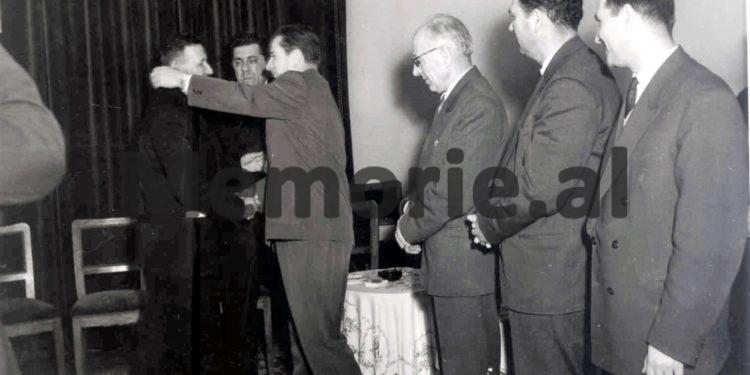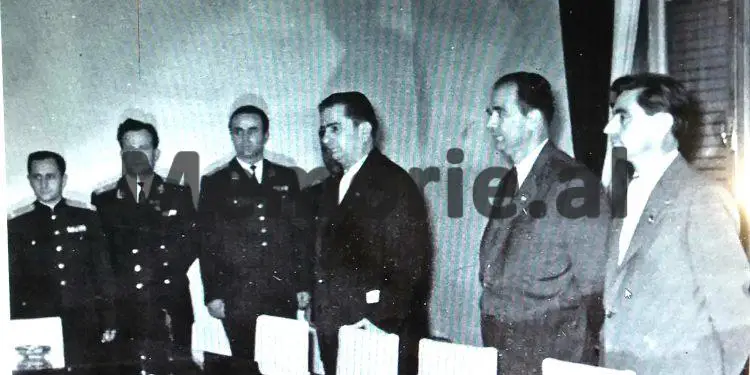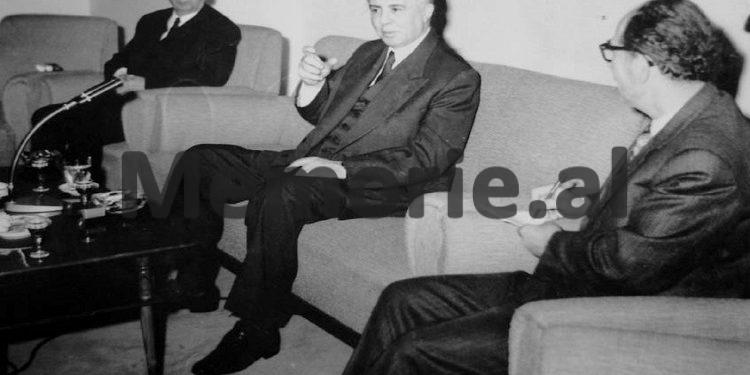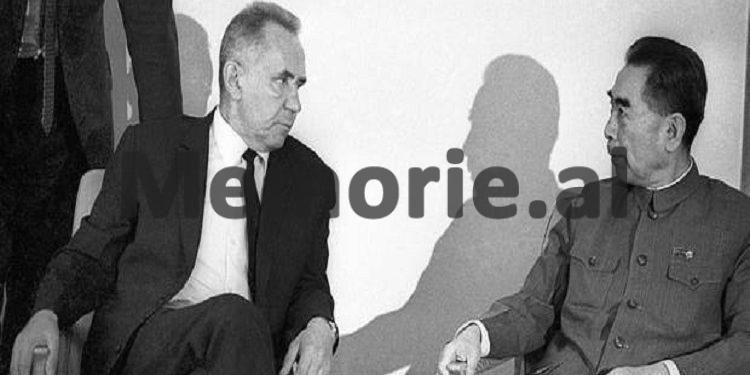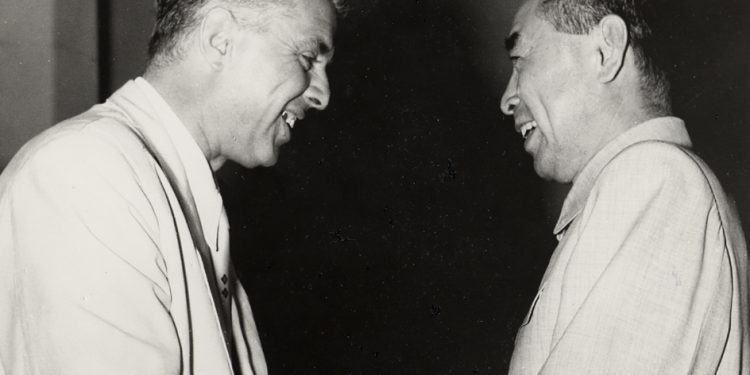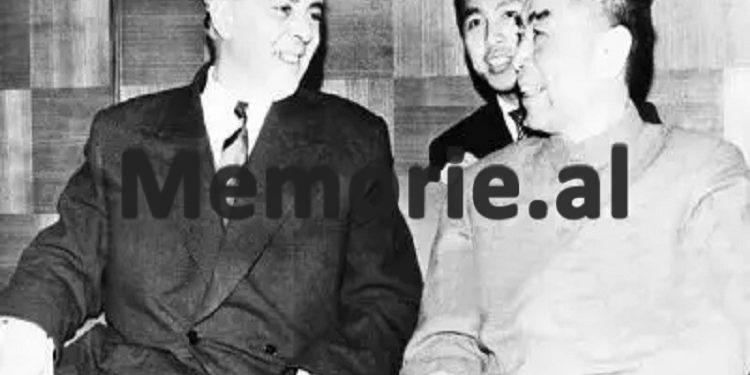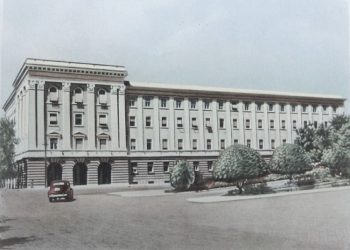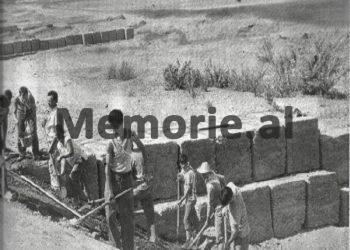Part Five
Memorie.al On September 2, 1969, at the age of 79, the Vietnamese communist leader, Ho Chi Minh, passed away. He was known as a communist revolutionary and statesman who, in the years 1945–1955, held the position of Prime Minister of Vietnam and from 1955 to 1969, as President of the Democratic Republic of Vietnam (North Vietnam). In 1957, when he was President of Vietnam, Ho Chi Minh also visited Albania, traveling to several districts of the country. Since the breakdown of official relations with the Soviet Union in 1961, the communist regime in Tirana, led by Enver Hoxha, considered Vietnam one of its friendliest and closest states, second only to the People’s Republic of China. Based on this, in September 1969, official Tirana sent a delegation to Vietnam to attend the funeral ceremonies of Ho Chi Minh. The delegation was led by Rita Marko, a member of the Politburo of the Central Committee of the Party of Labor of Albania (PPSh), who at the time also held the position of Deputy Chairman of the People’s Assembly of the People’s Republic of Albania and First Secretary of the Party Committee of the Durrës district. After returning from Vietnam and the People’s Republic of China, where the delegation made a friendly visit, as dictated by the “Party norms and rules,” Rita Marko reported to Enver Hoxha and the other “comrades” of the leadership regarding those visits. This is reflected in the relevant minutes, marked “Tepër sekret” (Top Secret), which Memorie.al is publishing in full in several installments, according to the meeting minutes documents located in the Central State Archive, Fund of the former Central Committee of the PPSh.
TOP SECRET
Notes taken during the verbal report given to the First Secretary of the Central Committee of the PPSh, comrade Enver Hoxha, on September 19, 1969, by comrade Rita Marko, head of the delegation that visited the Democratic Republic of Vietnam, to attend the funeral of President Ho Chi Minh, as well as the visit to the People’s Republic of China.
Comrade Enver invited the following comrades to the meeting to hear comrade Rita Marko: Mehmet Shehu, Haki Toska, Hysni Kapo, Ramiz Alia, and Xhafer Spahiu. Comrade Enver immediately gave the floor to comrade Rita Marko.
Continues from the previous issue
COMRADE ENVER HOXHA: Comrade Zhou Enlai told comrade Rita Marko that with this policy, we might disarm the Soviet revisionists. He also said that this, as well as their tendency for “peace,” and so on, would buy us time to prepare. This is a tactic. Gaining time is an important matter, but without violating our political principles.
It should be pointed out to the Chinese leaders that history has shown that anyone who is fascist and determined to commit aggression is not fooled by tactics, so we think that even the step you have taken, agreeing to hold this meeting, will not fool the Soviet revisionists into disarming.
We are convinced that the Soviet social-imperialists will never disarm, neither in front of us nor in front of American imperialism, as we are clear that the American imperialists will never disarm of their own free will.
COMRADE MEHMET SHEHU: It can also be considered that until now they have correctly assessed the Paris talks as a contrived effort by Moscow, but with this meeting they had, they indirectly justify the Vietnamese meeting with the Americans.
COMRADE ENVER HOXHA: I think all this should be pointed out to the Chinese leaders, but always bearing in mind that the discussions should not become strained, so we must speak tactfully and friendly with them, even though we know how much we are boiling inside, especially regarding this vile act.
We must always adhere to the principle of openly and friendly expressing our opinions to our friends. How much our stance will help our Chinese comrades, we do not know, but with this effort, we make it clear once again that we cannot simply follow their cart; we can never approve something that is wrong.
Only, as I emphasized, we must present everything we say to them with tact. Let us tell them that we consider this stance of theirs as a tactic on your part, but in our opinion, it is wrong, and time will prove it wrong.
After doing this, you can then talk about our friendship, the progress our two countries have achieved, etc.
Now we must think and find ways to tell them. These issues must be reported to the Chinese leaders, either by our delegation going to Beijing—naturally, if they raise this problem—or we can tell the Chinese Ambassador here, and then the weight falls on the delegation.
If they raise this topic of conversation, Hakiu can tell them, but if they do not speak at all, then how can they be told? If our delegation going to Beijing asks for a meeting, they might say they are very busy, or there might be no talks at all.
COMRADE RAMIZ ALIA: I think they will certainly have a meeting with our delegation.
COMRADE HAKI TOSKA: If there are meetings, we can raise this topic of conversation with them, emphasizing that the struggle against imperialism cannot be separated from the struggle against revisionism, etc.
COMRADE MEHMET SHEHU: If there is a meeting, our delegation must follow, as always, the tactic we usually follow – the hosts speak first.
COMRADE ENVER HOXHA: Our delegation is not going there for talks, but to participate in the celebration of the 20th anniversary of the proclamation of the People’s Republic of China, so it might happen that even if there is a meeting with them, the Chinese might think they have talked to us once about this issue, so they might not touch upon these topics anymore, (instead) they might talk to us about other things, like machinery, submarines, etc.
COMRADE MEHMET SHEHU: Then Hakiu should tell them that comrade Rita, upon returning to Albania, informed us about the meeting he had with you, and Hakiu takes the opportunity to present our viewpoint.
COMRADE ENVER HOXHA: Plus, they are waiting for a reply from us. Zhou Enlai himself told Rita at the beginning that (they) would inform us about this issue, because comrade Enver will ask you about it.
COMRADE MEHMET SHEHU: So, we have two possibilities to present our views to the Chinese leaders: one is for our delegation going now for the 20th anniversary to tell them; the other option is to summon the Chinese Ambassador in Tirana.
Who should be told that comrade Zhou Enlai discussed with comrade Rita Marko the meeting he had with Kosygin, and our opinion on this matter would be presented?
COMRADE ENVER HOXHA: Our delegation can also tell them, but definitely with great care, because we must keep in mind the great, rightful, socialist interests, as well as the internal political and economic interests. It is a fact that since we are dealing with these problems in this way, it means that we do not agree with them.
We also disagreed with the Chinese leaders in the past, but later we thought that the relations between the two sides had improved, that our contradictions and disagreements had softened compared to what they had been before.
However, as Zhou Enlai presents the issues, it turns out that the disagreements between us are very pronounced, (and that) they concern the Party line, so if they continue to walk down this road, we will undoubtedly clash with them, because we do not agree on things that are essential matters, on issues related to the Party line, which are among the most fundamental.
We must also bear in mind the fact that when we had disagreements between us in the past, when we were very measured, we noticed that they retreated. We have always defended our line, but we have supported China, the Chinese Communist Party, the Cultural Revolution, and Mao Zedong. We will do this again, but at the same time, without the slightest concession, we will strik1e all their deformations.
The question arises that it can be concluded, and it will definitely be concluded, that there are contradictions between our two sides. Now it depends on the disposition of the Chinese leaders for us to determine our position. If they take measures against us, we will certainly and immediately react. But they might be afraid of our stance, and, as we have noticed, ideologically, they are very afraid of us.
The revisionist group in China is very afraid of our Marxist-Leninist Party and might try to avoid a clash, so I think they will not further aggravate the situation, although they will continue their work.
For our part, as always, we will fight to keep our Party line intact, and we will uphold the principles; we will even drop bombs, but we will continue to maintain ties with them, we will try to benefit as much as possible from these ties, in the interest of the great cause of socialism and our country.
This means we must get the industrial facilities we contracted with the Chinese, because we foresee that in the bad times to come, we will resist, even if alone, even if we may not be alone.
COMRADE MEHMET SHEHU: Can Xhemal Shehu, who is going with this delegation in his capacity as Corps Commissar, be authorized to request a meeting with someone from the Chinese staff officers to expedite the sending of military supplies, based on the contract agreements?
COMRADE ENVER HOXHA: They have told us before that they are very busy, so maybe we are wrong to ask for this meeting. Even so, what would Xhemali do with them?!
MEHMET SHEHU: After the meeting, Hakiu can tell them, for example, that comrade Commissar Xhemal Shehu wants to meet with an officer from their Ministry of Defense to talk about the military supplies that can be sent to us as soon as possible, as the Soviet Union is a threat to us.
COMRADE RAMIZ ALIA: It seems to me that this request would not work, because Xhemal Shehu is not an employee of the Ministry of Defense, but is a Corps Commissar, so he should not engage in state-level talks.
COMRADE ENVER HOXHA: The talks our delegation will have with the Chinese will focus on political, not economic issues, so Xhemali cannot raise issues concerning the supply of military material with them.
In the end, watch how the situation develops. If there are favorable circumstances, do not let this issue be lost. I am not well informed, but it seems to me that the Chinese are not hindering our military supplies.
COMRADE MEHMET SHEHU: They are a bit behind with the tanks and heavy artillery, comrade Enver.
COMRADE ENVER HOXHA: Ok, the comrades who go there should act in accordance with how they view the situation.
COMRADE RITA MARKO: When I spoke with the Chinese leaders about the situation in our country and the successes we have achieved this year, Kang Sheng said, not unintentionally, in my opinion, that the Chinese Ambassador in Tirana has informed him that this year Albania had abundant harvests and would secure its own bread.
For this reason, at the end of the talks, I requested a clarification on this matter, and with this information, I clarified the issue for them. Then Kang Sheng intervened and told me: “Perhaps you need our help with wheat?” I was not referring to this, I replied; I only wanted to clarify this matter.
When Zhou Enlai spoke about foreign affairs, he said that Ceaușescu had the courage to declare that he had organized the meeting with Kosygin, while in fact it was organized through the Vietnamese. I took the opportunity to show them what kind of person Ceaușescu is.
COMRADE ENVER HOXHA: So, let us approach this issue carefully with them.
COMRADE MEHMET SHEHU: It is important for us that they clearly understand that they cannot quickly come to an agreement with us.
COMRADE ENVER HOXHA: They are not yet strong enough to come out openly. We have often told Zhou Enlai many things, but later, when we met, he said that they helped us a little.
COMRADE MEHMET SHEHU: At that time, he also had their leader by his side, but nevertheless did not dare to go further, but now, he no longer has him, so I think it will be more difficult for him.
COMRADE RITA MARKO: It seems that Zhou Enlai has concentrated all the work in his hands, [and] deals with all sectors, including the party, the army, etc.
COMRADE ENVER HOXHA: The Chinese leaders do not think correctly about strategy and tactics issues.
COMRADE MEHMET SHEHU: Since they managed to hold this meeting at the Beijing airport, I do not think they will stop on their path; the people in this group have thought about this and are trying to go further.
We saw the evolution at the airport. At first, Zhou Enlai greeted Kosygin coldly, but when they said goodbye, they exchanged warm handshakes.
COMRADE HAKI TOSKA: Also, although it was the Soviets who requested the meeting, Zhou Enlai did not present anything about what Kosygin set out in this meeting.
COMRADE RITA MARKO: He told us that he raised the issue of contracts.
COMRADE MEHMET SHEHU: We are clear that he did not raise just this. I imagine Kosygin might have told Zhou Enlai that; “If you continue with your current stance, it will be to your detriment and ours, (so) understand us comrades, we want to be united, for our two countries to build socialism, let us focus on what unites us and not on what divides us… etc.”! We know very well what the Soviet revisionists say in these types of meetings. Memorie.al




